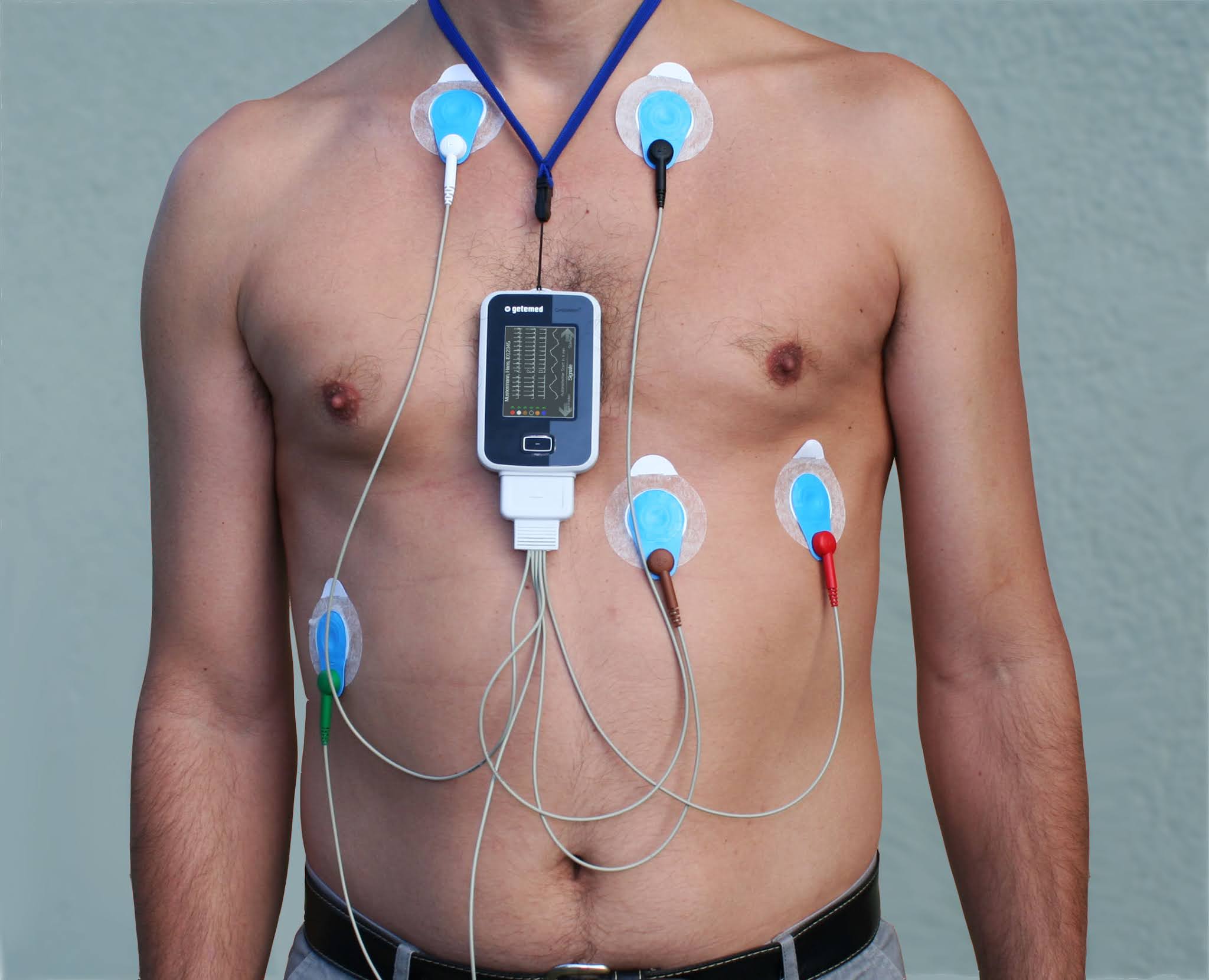Holter Monitoring Interpretation
What is Holter Monitoring?
ECG, EKG, and Holter Monitor: What's the Difference?
ECG and EKG are simply different ways of spelling the same thing: electrocardiogram.
Both refer to a test that measures the electrical activity of your heart at a specific moment in time. It’s a quick and painless test that involves attaching electrodes to your chest.
A Holter monitor is a portable device that records your heart’s electrical activity continuously over a 24-hour or longer period. Unlike an ECG, which provides a snapshot of your heart’s activity, a Holter monitor offers a more comprehensive view by capturing your heart rhythm over an extended period. This makes it useful for detecting irregular heartbeats that may occur intermittently and not be captured during a standard ECG. Essentially, an ECG is a brief test, while a Holter monitor provides a longer-term view of your heart’s activity.
What’s the Difference Between Holter and Event Monitoring?
A Holter monitor provides continuous heart rhythm monitoring for an extended period. In contrast, an event monitor only records your heart’s activity when you activate it, typically when you experience heart-related symptoms.

Why is Holter Monitoring Done?
Holter monitoring is a valuable tool for:
- Diagnosing intermittent arrhythmias that may not be detected during a regular electrocardiogram (ECG).
- Evaluating the effectiveness of heart medications.
- Monitoring the heart after a heart attack or surgery.
- Investigating symptoms such as palpitations, dizziness, or shortness of breath.
Who Needs a Holter Monitor?
A Holter monitor might be recommended if you’ve experienced heart-related symptoms that an electrocardiogram (ECG) couldn’t fully explain.
The American College of Cardiology (ACC) and the American Heart Association (AHA) recommend Holter monitoring as a primary diagnostic tool for patients experiencing unexplained fainting, near-fainting, palpitations, racing or fluttering heartbeats, or dizziness. This is particularly useful when symptoms are inconsistent or difficult to pinpoint based on medical history, physical examination, or a standard electrocardiogram (ECG). However, the effectiveness of Holter monitoring is limited in cases where symptoms occur infrequently.
How Does Holter Monitoring Work?
The Holter monitor consists of a small recording device and electrodes that are attached to your chest. The electrodes pick up your heart’s electrical signals, which are then recorded by the device. When the monitoring period is over, the device is returned to your Interventional Cardiologist for analysis.
Risks of Holter Monitoring
While Holter monitoring is generally safe, it’s essential to be aware of potential minor discomforts:
Skin irritation
Some individuals may experience mild skin irritation where the electrodes are attached.
Discomfort
The electrodes and wires might cause slight discomfort, but this is typically minimal.
If you experience any of these unusual symptoms during the monitoring period, contact your Interventional Cardiologist immediately.
Precautions During Holter Monitoring
To ensure accurate results, it’s crucial to take the following precautions
Avoid electromagnetic interference
Keep electronic devices like cell phones, microwave ovens, and electric razors at a distance to prevent interference with the monitor’s signals.
Protect the monitor
Avoid water exposure as it can damage the device
Accurate symptom recording
Maintain a detailed diary of your symptoms and activities to assist in interpretation.
Holter Monitoring Procedure
While Holter monitoring is generally safe, it’s essential to be aware of potential minor discomforts:
Preparation
- Schedule an appointment with your Interventional Cardiologist for the monitor placement.
- Bathe before the appointment, as the monitor must remain dry during the monitoring period.
Monitor Placement
- Electrodes will be attached to your chest to detect heart signals.
- The Holter monitor device will be connected to the electrodes and secured to your body.
Monitoring Period
- The monitor is typically worn for 1-2 days.
- Continue your daily activities, but avoid strenuous physical exertion that might dislodge the electrodes.
- Record any symptoms you experience, such as palpitations, shortness of breath, or chest pain.
Monitor Return
- Return the monitor to your Interventional Cardiologist at the end of the monitoring period.
Results and Follow-up
Your Interventional Cardiologist will analyze the recorded heart data and discuss the findings with you. Based on the results, they may recommend further tests, medications, or lifestyle changes.
What is Holter Monitoring Interpretation?
Holter monitoring interpretation is the process of analyzing the recorded heart data to identify any abnormalities in heart rhythm. Your Interventional Cardiologist examines the recorded electrical signals to determine if there are any irregularities, such as
Normal sinus rhythm
Atrial fibrillation
Bradycardia
Other arrhythmias
Interpretation of Results
Your Interventional Cardiologist will analyze the Holter monitor recording to identify any abnormalities in your heart rhythm. Here are some common findings
Normal heart rhythm
This is called sinus rhythm and is characterized by a regular heartbeat with a normal rate.
Atrial fibrillation
This is a common arrhythmia where the upper chambers of the heart (atria) beat irregularly and rapidly.
Bradycardia
This refers to a slow heart rate.
Tachycardia
This refers to a rapid heart rate.
Other arrhythmias
There are many other types of arrhythmias that can be detected by a Holter monitor, including premature atrial contractions, premature ventricular contractions, and supraventricular tachycardia.
Factors Affecting Holter Monitoring Interpretation
Several factors can influence the interpretation of a Holter monitor recording
Interference and artifacts
Noise from electrical devices or movement can interfere with the recording.
Patient factors
Medications, exercise, and stress can affect heart rate and rhythm.
Accurately interpreting Holter monitor results is crucial for diagnosing heart conditions and developing effective treatment plans. Dr. Mazen Shaheen offers expert Holter monitoring interpretation services, providing patients with clear and comprehensive insights into their heart health. With his extensive experience in Holter monitoring, Dr. Shaheen ensures the highest level of accuracy and precision in analyzing Holter monitor data.
Book an appointment with Dr. Mazen Shaheen to receive expert Holter monitoring interpretation and personalized care for your heart health.
General FAQs
Typically, a Holter monitor recording lasts for 24 to 48 hours. However, in some cases, your Interventional Cardiologist may request a longer recording period.
There’s usually no special preparation needed for a Holter monitor. The technician may need to shave a small area on your chest where they’ll attach the electrodes.
While wearing a Holter monitor, it’s essential to keep the electrodes dry and avoid activities that might dislodge them. You should also avoid taking baths or showers. You can continue with your normal daily activities, but it’s important to keep a diary of your symptoms and activities during the monitoring period.
Why Choose Coronary Artery Disease Treatment in the UAE?
Expertise
Dr. Mazen brings a wealth of experience and specialized knowledge in diagnosing and treating complex structural heart conditions all the way from the United States to Dubai.
Personalized Care
Advanced Technology
Minimally invasive procedures for optimal outcomes.
Compassionate Care
A supportive and patient-centered approach throughout your treatment journey.
Proven Results
Secure Your Path to Better Heart Health!

